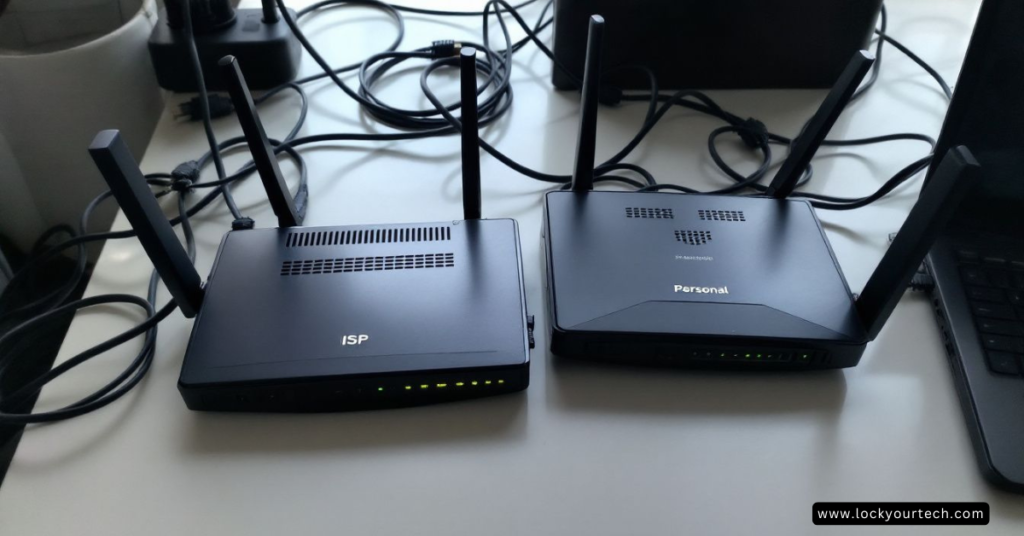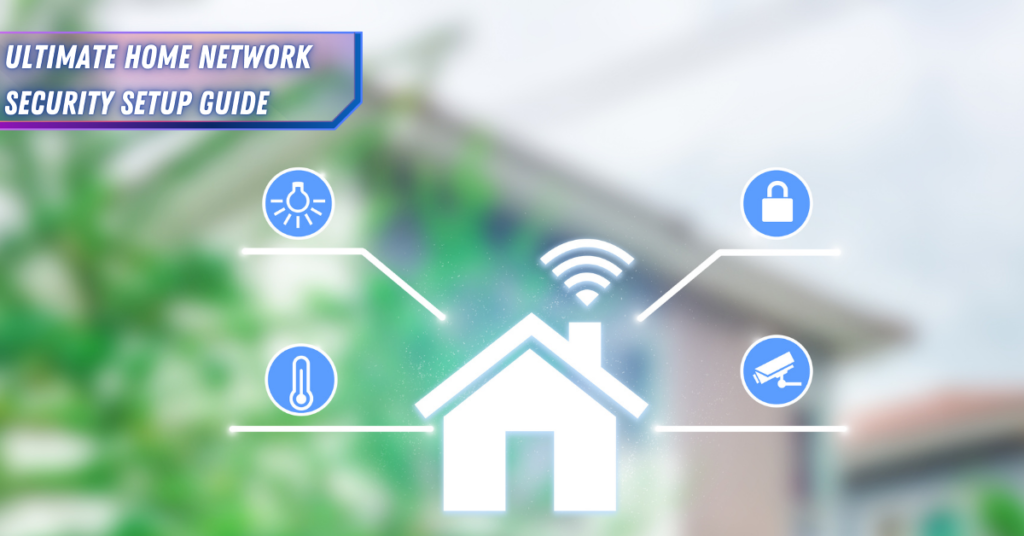I discovered something alarming when analyzing my ISP-provided router last month – it hadn’t received a security update in over a year! This got me thinking about the hidden security risks millions of people might be facing with their ISP routers. After diving deep into router security for the past few years, I’ve uncovered some eye-opening differences between ISP router vs personal router that every internet user should know about.
Let’s dive in.
Key Takeaways
- Personal routers cost more upfront but can save money in the long run compared to ISP router rental fees.
- Personal routers offer more features, such as advanced security options, VPN support, and parental controls, providing greater control over your home network.
- ISP routers are easier to set up and include technical support, making them a good option for those who prefer simplicity.
- The choice between an ISP router and a personal router depends on individual needs like budget considerations, desired network customization, and specific security requirements.
- Evaluating home size and network demands is crucial for selecting the right router that offers adequate coverage and supports multiple devices effectively.
ISP Router vs Personal Router: Key Differences
ISP routers and personal routers differ in ownership, cost, features, and customization options. Personal routers provide greater control over network settings, while ISP routers are often easier to set up and come with support included with the internet service.
Ownership and Cost
From my own encounter, I noticed that ISP routers often come attached with a monthly lease payment. It might appear tiny initially, but over time, it leads to a significant cumulative expense.
Conversely, purchasing my Wi-Fi router required an immediate payment, yet it started paying off after just a few months compared to the potential expense of renting from my ISP.
Assessing long-term expenditures and calculating the break-even point is crucial. To me, deciding to invest in a personal router did more than just cut costs. It provided superior performance and greater control over my domestic network.
I could select features like parental controls and support for multiple devices without fretting over match-up with an ISP’s modem or gateway limitations. The upfront costs were offset in reducing fees but also enhancing my home’s service quality.
Features and Customization Options
As we move past the initial cost and ownership, let’s explore the unique attributes of each router type, specifically their features and customization alternatives. Personal routers impress me with their advanced network management tools.
They provide complete control over such preferences as DNS servers, guest network creation, and even setting up a Virtual Private Network (VPN) for enhanced privacy and security online.
This flexibility enables me to adjust my home network perfectly to my needs, whether I’m focusing on keeping my kids safe on the internet with parental controls or improving the quality of service for streaming Netflix without buffering.
ISP-provided routers can seem quite limited in comparison. They typically offer fewer opportunities to adjust settings to meet my personal preferences. For example, implementing specific security measures or managing how bandwidth is shared among devices on your network can be a bit of a puzzle.
Despite these constraints, they do have some advantages; the convenience of setup and direct aid from ISPs can be beneficial for users who lean more toward simplicity rather than customization.
The ability to customize my internet experience according to my preferences is what I prioritize the most.
Firmware and Security Updates
I found that personal routers often get more regular firmware updates. This keeps them safer and works better over time. My own router got a new update just last month, boosting its performance.
On the other hand, I heard my friend’s ISP-provided router hasn’t seen an update in over a year. It makes me think about how important security is for our home networks.
Personal routers also come with stronger security features. I set up extra protection on mine to keep my data safe from hackers. It lets me sleep better at night, knowing my family’s online activities are protected.
With these routers, you can customize settings to meet your specific needs, something you can’t do with most provided by ISPs.

Benefits of Using an ISP Router
Using an ISP router ensures ease of setup and support. It also comes included with the internet service, saving you money in the long run.
Ease of Setup and Support
ISP routers offer convenient setup and comprehensive technical support, making them an ideal choice for those looking for simplicity.
Included with Internet Service
The router provided with internet service typically comes from the Internet Service Provider (ISP). It may be part of a bundle or available for rental. ISPs sometimes charge monthly fees for this, which can accumulate over time.
Moreover, some technical support services for ISP routers are usually included as part of the internet service package. This might involve troubleshooting and assistance with setup and maintenance.
Advantages of Personal Routers
Personal routers offer enhanced speed and range, delivering a stronger and broader Wi-Fi signal coverage for seamless connectivity. Furthermore, they enable advanced features such as parental controls and VPN support, addressing individual network customization requirements and emphasizing security.
Improved Speed and Range
Personal routers provide significant benefits in terms of speed and range. These routers typically offer improved Wi-Fi speeds compared to ISP-provided options, resulting in faster internet connections for all devices.
Additionally, personal routers often include advanced technologies such as multiple input, multiple output (MIMO), beamforming, and tri-band capabilities, which contribute to enhanced wireless performance and coverage throughout the home.
This means fewer dead spots and a more consistent connection across various areas within the household.
Moreover, personal routers are crafted to maximize signal strength and range. They use powerful antennas and innovative features such as mesh networking to extend Wi-Fi coverage over larger areas effectively.
With these attributes, users can enjoy reliable connectivity even in larger homes or spaces with complex layouts.

Advanced Features like Parental Controls and VPN Support
Personal routers offer advanced features like parental controls, which allow me to manage and monitor my family’s online activities, ensuring a safer internet experience for everyone.
- Parental Controls: Personal routers provide customizable settings to limit access to specific websites or content categories, giving parents greater control over what their children can view online.
- Time Management: With parental controls, I can set time limits for internet usage on particular devices to encourage healthy screen time habits for my family.
- VPN Support: Personal routers offer built-in support for Virtual Private Network (VPN) connections, allowing me to encrypt and secure our internet traffic when accessing sensitive information or browsing the web from external networks.
- Enhanced Privacy: By using a VPN through my personal router, I can browse anonymously and protect my digital footprint from potential cyber threats and unauthorized surveillance.
- Secure Remote Access: With VPN support, I can securely access home network resources while away from home, ensuring privacy and data protection even when using public Wi-Fi networks.
These advanced features empower me to create a safer and more private online environment for my family while enjoying the convenience of secure remote access through a personal router.
Greater Control Over Network Settings
A personal router enables me to customize my network settings to fit my specific needs. Advanced DNS options offer advanced traffic management, and extensive customization features allow for personalized network configuration.
This results in improved Wi-Fi coverage, thus improving connection stability and performance. Additionally, the device provides strong threat protection through its enhanced security capabilities, ensuring a safer browsing experience for all connected users.
Furthermore, the personal router offers advanced user management options such as guest networks and parental controls. These features not only ensure a secure browsing environment but also offer more control over internet traffic management.
The ability to configure these settings gives me greater flexibility in optimizing the network’s performance to meet my personalized needs.
Factors to Consider When Choosing a Router
When choosing a router, it’s essential to consider your budget and long-term costs, the size of your home and network requirements, as well as your security and privacy needs. For more detailed insights into selecting the right router for your specific situation, continue reading.
Budget and Long-Term Costs
When choosing between an ISP router and a personal router, it’s crucial to consider long-term finances. Rental fees for ISP routers can add up over time, affecting financial planning.
Conversely, personal routers have varying initial costs, impacting upfront investment decisions. It’s important to note that personal routers generally have a longer lifespan than rented ISP models.
Calculating a break-even point can help determine when investing in a personal router becomes cost-effective compared to ongoing rental fees from ISPs. It’s advisable to conduct a cost-benefit analysis to assess the benefits of personal routers against the continued expenses linked to renting from ISPs.
Home Size and Network Requirements
The size of a home significantly impacts the Wi-Fi coverage, which affects the selection of an appropriate router. For larger homes, it’s important to consider routers with strong signal strength to ensure seamless coverage throughout the entire space.
Factors such as home layout and building materials can also contribute to potential Wi-Fi dead zones. Additionally, understanding network requirements is crucial for determining the number of devices that will be connected and their usage patterns.
This insight helps in choosing a router that can efficiently manage these demands and maintain stable connections for optimal user experience.
When selecting a router tailored to specific home sizes and network needs, one must carefully assess factors such as bandwidth capacity, signal reach, and stability under heavy usage.
These considerations are crucial in ensuring consistent connectivity across various areas within the residence while accommodating multiple users and diverse internet activities conducted on different devices simultaneously.
Security and Privacy Needs
Security and privacy are of utmost importance when selecting a router. Personal routers provide superior threat protection capabilities compared to ISP-provided options, bolstering the security of your network.
Moreover, personal routers frequently offer enhanced parental controls for better management of children’s online activities while upholding overall network security. Additionally, the guest network functionalities in personal routers safeguard visitors’ privacy without compromising the security of the main network.
It’s essential to prioritize security and privacy requirements when evaluating router options, as they directly affect the safety and confidentiality of your digital interactions.
Conclusion
Ultimately, deciding between an ISP router and a personal router is a crucial choice that greatly affects the home networking experience. The important thing is to carefully consider factors like ownership cost, customization options, and security features to make an informed choice suited to your specific needs.
Keep in mind, the right router can unlock seamless internet access with improved speed, coverage, and network management capabilities – all essential for today’s constantly changing digital world.
So whether it’s handling complexities or desiring more than just Wi-Fi access, making a well-suited router decision is the foundation of a strong network solution.
FAQs
1. What are the differences between an ISP router and a personal router?
An ISP (Internet Service Provider) router is provided by your internet company, while a personal router is one you buy yourself. Personal routers often come with advanced features, better bandwidth capability, and offer more control over settings like Wi-Fi hotspots or QoS (Quality of Service).
2. Can using my own router instead of the ISP’s improve my internet speed?
Yes! A new Wi-Fi router can potentially increase your internet speed depending on its specifications and your current internet plan. Some modern routers support higher speeds than those provided by ISPs.
3. Is it cost-effective to replace my ISP’s device with a separate modem and router?
In many cases, buying your own modem and wireless router can save you money in the long run as it eliminates paying a rental fee to the ISP which often amounts to $10 per month or more.
4. How does having two separate devices – a modem and a DSL/Wi-fi Router impact my home network?
Having two separate devices allows for greater flexibility in upgrading one without changing the other. For instance, if something goes wrong with one of them or if there are major technological advances like Wi-Fi 7.
5. Does using my own equipment give me more control over security settings?
Absolutely! Having your own equipment gives you lot more control over various aspects including computer security measures such as password management, domain name system (DNS) adjustments, multi-user MIMO settings for improved wireless access point performance etc.
6. Are there any drawbacks to using a personal modem-router combo rather than sticking with what’s provided by the ISP?
While having your own gear offers benefits like potential cost savings and increased control; if something goes wrong with either device outside warranty period, repair costs fall on you unlike when using an isp-provided unit where they handle repairs/upgrades.



